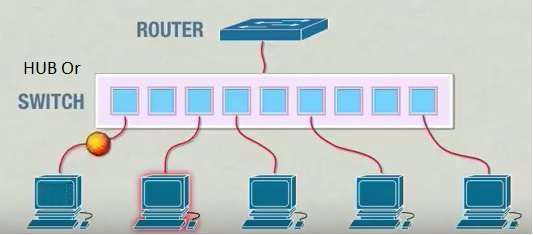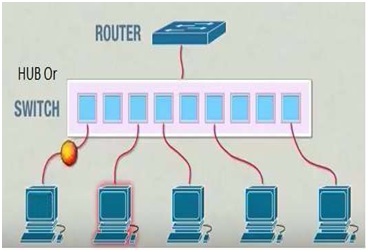
The difference between WLAN and Ethernet LAN
We thought it would be very useful to have a comparison between WLAN (Wireless LAN) and Wired LAN – The following post describes the difference between WLAN and Ethernet LAN.
In the figure-1 below, you will see the wlan or wireless LAN network. It operates on radio frequency 2.4 GHz or 5.8 GHz or both as per IEEE 802.11 specifications. There are various WLAN versions viz. 802.11a, 11b, 11g, 11n, 11ac and 11ad etc. The latest WLAN versions incorporate multiple antenna based MIMO techniques to provide support for higher data rates.

In figure-2 below, you can see the ethernet lan network. You might like to also look up Ethernet types such as ethernet, fast ethernet and gigabit ethernet.

In summary, the core differences between wlan and ethernet LAN types are as follows:
| WLAN | Ethernet LAN |
|---|---|
| The WLAN devices are based on IEEE 802.11 family of standards. | The Ethernet LAN devices are based on IEEE 802.3 standards. |
| WLAN devices use high energy radio frequency waves to transmit the data. | Ethernet LAN devices use electric signals to transmit the data. |
| Radio frequency waves travel in the space. Hence a physical connection is not needed between the devices which are connected to the WLANs. | Electric signals flow over the cables. Hence wired connection is needed between devices which are connected to the Ethernet LANs. |
| WLAN uses half duplex mechanism for communication. | Ethernet supports full duplex mechanism for communication when a switch connects using a single device rather than hub. |
| WLANs suffer from interference of various types during travel from source to the destination. | LANs suffer less interference as electric signals travel using cables. |
| WLANs use CSMA/CA to avoid collisions in the network. | Ethernet LANs use CSMA/CD to detect collisions in the network. |
For more info: http://www.rfwireless-world.com/Terminology/WLAN-vs-Ethernet-LAN.html
Contact us!
London 0203 322 2443 | Cardiff 02920 676 712 | Hampshire 01962 657 390 | Email [email protected]
